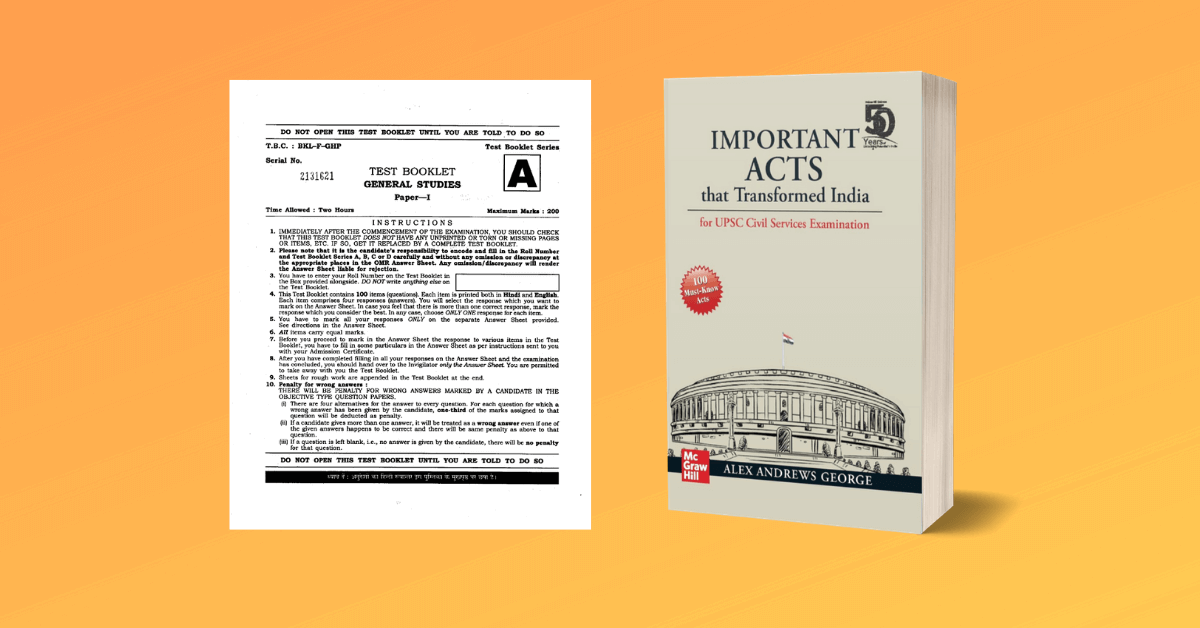
ClearIAS is reputed for its close observation and analysis of UPSC trends.
Even months before UPSC Prelims 2020, we had published our finding that Important Acts is a priority area for all IAS/IPS aspirants preparing for UPSC Civil Services Preliminary and Main Exam.
Our observation was purely based on previous year question trends, which many aspirants (and mentors) had missed. In 2019, 11 questions were asked from the topic. It was very obvious to us that UPSC expects future Civil Servants to be knowledgeable about the important Acts/Bills/Rules etc. However, there was no book dedicated to Acts/Bills before.
To help aspirants save time and effort to cover hundreds of Acts and Bills, the expert Civil Services Trainer, Alex Andrews George (founder of ClearIAS), authored a book ‘Important Acts that transformed India‘ which covered 100 must-know Acts for UPSC aspirants.
The book was released by September 2020, enabling aspirants quick learning before Prelims.
Even this year too (UPSC CSE 2020) the trend turned out not different.
Important Acts remained the single prominent theme from which maximum questions are asked (6 Questions, 12 marks). If an aspirant wrongly answered all these questions, he/she would have lost 16 marks (considering the impact of additional -0.66 negative marks).
In this post, we help aspirants realise the importance of the topic for upcoming exams.
1. Question based on the provisions of The Representation of People Act 1951
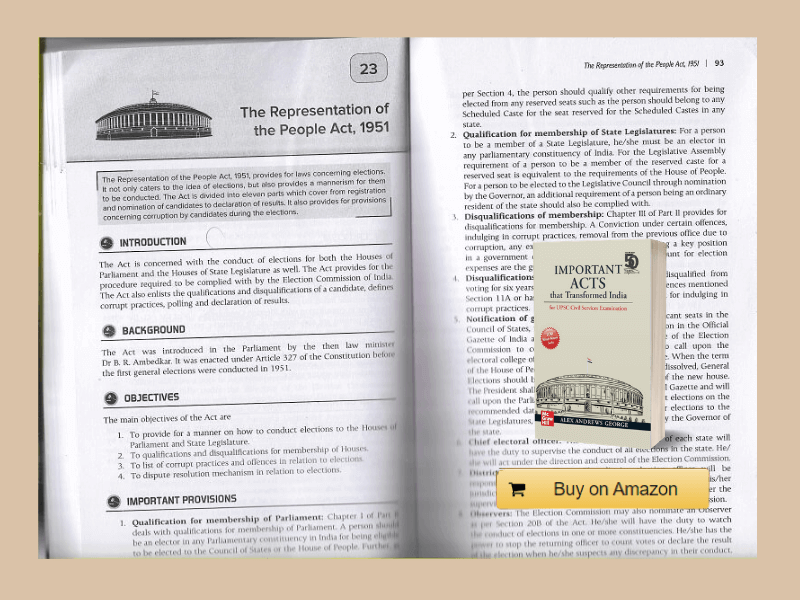
Question UPSC CSE 2020) Consider the following statements:
1. According to the Constitution of India, a person who is eligible to vote can be made a minister in a State for six months even if he/she is not a member of the Legislature of that State.
2. According to the Representation of People Act, 1951, a person convicted of a criminal offence and sentenced to imprisonment for five years is permanently disqualified from contesting an election even after his release from prison.
Which of the statements given above is/are correct?
(a) 1 only
(b) 2 only
(c) Both 1 and 2
(d) Neither 1 nor 2
Reference: Important Acts that Transformed India, Chapter: The Representation of the People Act, 1951, Page: 93
2.Question based on the provisions of The Aadhar Act 2016
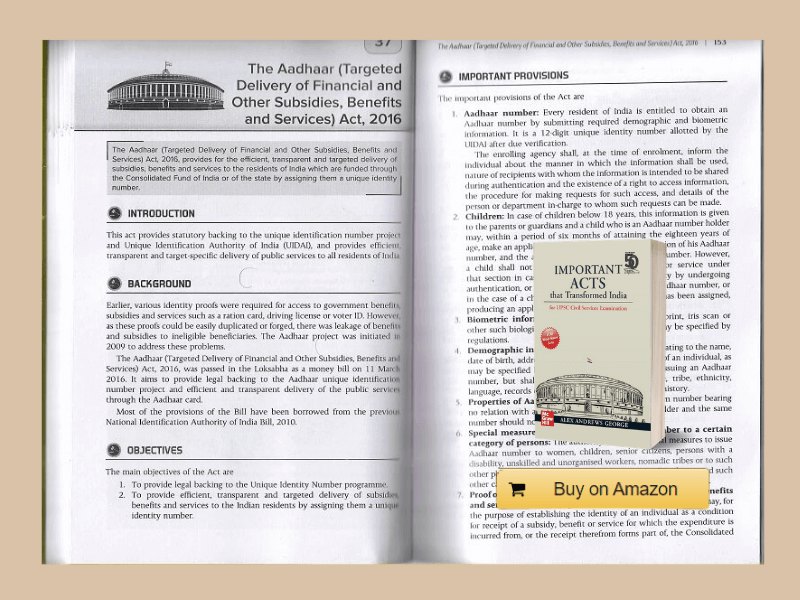
Question UPSC CSE 2020) Consider the following statements:
1. Aadhaar metadata cannot be stored for more than three months.
2. State cannot enter into any contract with private corporations for sharing of Aadhaar data.
3. Aadhaar is mandatory for obtaining insurance products.
4. Aadhaar is mandatory for getting benefits funded out of the Consolidated Fund of India.
Which of the statements given above is/are correct?
(a) 1 and 4 only
(b) 2 and 4 only
(c) 3 only
(d) 1, 2 and 3 only
Reference: Important Acts that Transformed India, Chapter: The Aadhaar (Targeted Delivery of Financial and Other Subsidies, Benefits and Services) Act, 2016, Page: 153, 154
3. Question based on the provisions of The Fiscal Responsibility and Budget Management Act, 2003
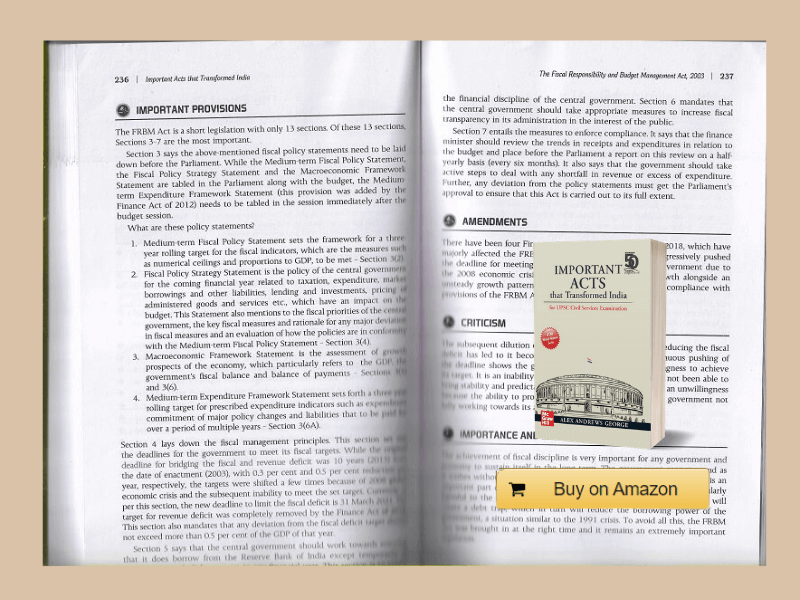
Along with the Budget, the Finance Minister also places other documents before the Parliament which include “The Macro-Economic Framework Statement. The aforesaid document is presented because this is mandated by
(a) Long-standing parliamentary convention
(b) Article 112 and Article 110 (1) of the Constitution of India
(c) Article 113 of the Constitution of India
(d) Provisions of the Fiscal Responsibility and Budget Management Act, 2003
Reference: Important Acts that Transformed India, Chapter: The Fiscal Responsibility and Budget Management Act, 2003, Page No: 236
4. Question based on the provisions of The Environment Protection Act
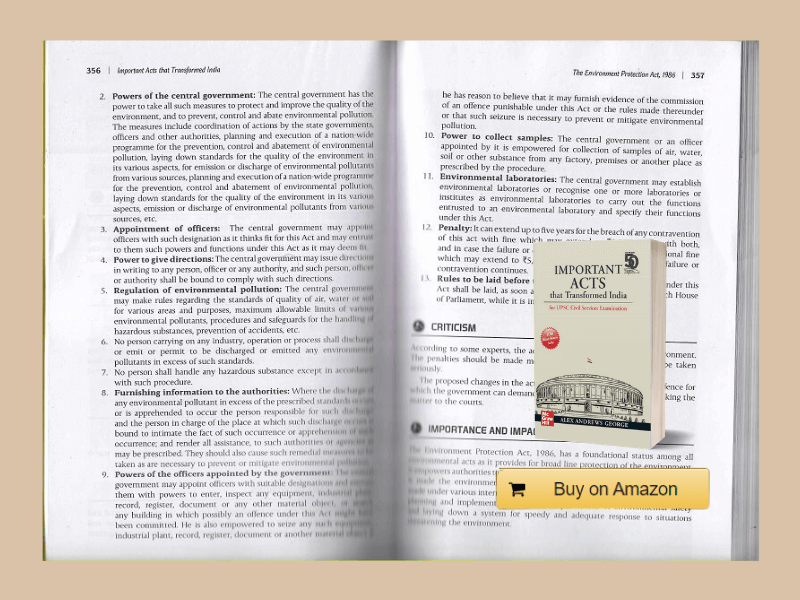
Question UPSC CSE 2020) Consider the following statements:
- 36% of India’s districts are classified as “overexploited” or “critical” by the Central Ground Water Authority (CGWA).
- CGWA was formed under the Environment (Protection) Act.
- India has the largest area under groundwater irrigation in the world.
Which of the statements given above is/are correct?
(a) 1 only
(b) 2 and 3 only
(c) 2 only
(d) 1 and 3 only
Reference: Important Acts that Transformed India, Chapter: The Environment Protection Act, 1986, Page: 356
5. Question based on the provisions of The Wildlife Protection Act 1972
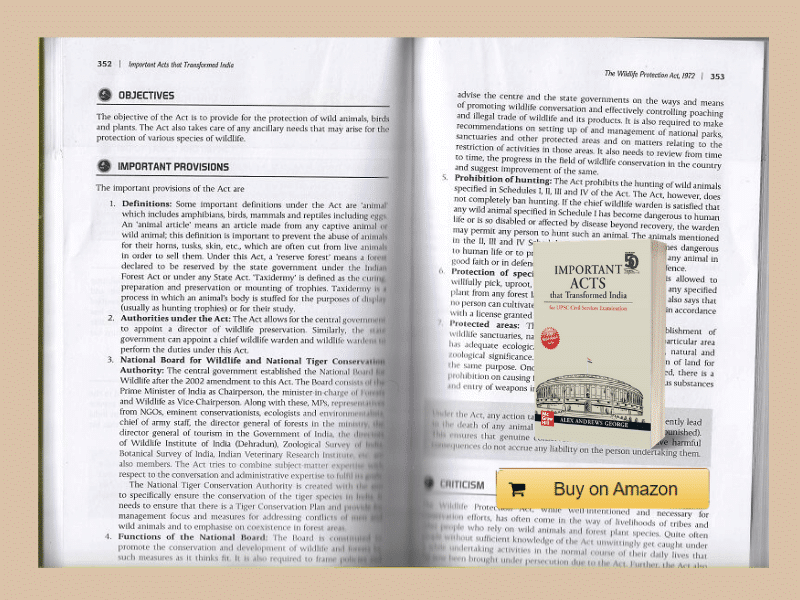
Question UPSC CSE 2020) If a particular plant species is placed under Schedule VI of The Wildlife Protection Act, 1972, what is the implication?
(a) A licence is required to cultivate that plant.
(b) Such a plant cannot be cultivated under any circumstances.
(c) It is a Genetically Modified crop plant.
(d) Such a plant is invasive and harmful to the ecosystem
Reference: Important Acts that Transformed India, Chapter: The Wildlife Protection Act, 1972, Page: 354
6. Question based on the provisions of The Legal Services Authorities Act 1987
Question UPSC CSE 2020) In India, Legal Services Authorities provide free legal services to which of the following type of citizens?
1. Person with an annual income of less than Rs 1,00,000
2. Transgender with an annual income of less than Rs 2,00,000
3. Member of Other Backward Classes (OBC) with an annual income of less than Rs 3,00,000
4. All Senior Citizens
Select the correct answer using the code given below :
(a) 1 and 2 only
(b) 3 and 4 only
(c) 2 and 3 only
(d) 1 and 4 only
Not covered as part of the 100 Must-Know Acts in the book. We will add this along the Online Learning Materials provided.
Conclusion
We don’t intend to say that every UPSC Question was picked from the book.
The book was released only on September 2020. UPSC Question paper should have been set much before that.
We also don’t mean to claim that all questions phrases are directly mentioned in the book. Some questions could be directly answered, while some questions need an additional application of understanding and co-relation.
The purpose of this post is to make aspirants aware that ‘important acts’ is a high-priority topic from which a lot of questions are asked in both Prelims and Mains. There is no surprise in this because UPSC expects future IAS and IPS officers to be knowledgeable about the important Acts/Bills/Rules etc.
You can download the comparison PDF here.
It’s the mission to ClearIAS to add real value in learning. The author, Alex Andrews George, earlier, had also come up with another best-selling book on Judiciary – Important Judgments that transformed India – which covered 30 landmark Supreme Court Cases. All online and offline initiatives of ClearIAS are intended to save the time and effort of aspirants who prepare by self-study. We wish to make your life easy and better!
For more details of the ‘Important Acts that Transformed India’ book and its contents refer: 100 Must Know Acts Enacted by the Indian Parliament.






Leave a Reply